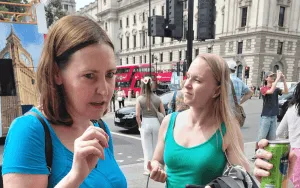The government has refused to clarify comments by the prime minister which suggested that all claimants of long-term sickness benefits will be expected to look for work under Labour’s social security reforms.
The refusal came as Mims Davies, the last Conservative minister for disabled people before July’s election defeat, told Disability News Service (DNS) that she would never have gone as far as Sir Keir Starmer did in his interview with the BBC.
He told the Today programme last week (listen from two hours, 10 minutes) that, “in relation to long-term sickness, which is at very high levels, then of course people need to look for work”.
After being asked – by the BBC’s Nick Robinson – if he believed that “those who are out of work, who may think that they can’t work, that the country has a right to expect that they look for work, they do everything they can to get work” and that this was “the sacrifice they need to make”, Sir Keir said: “Well, yes, of course.”
He also said that the “basic proposition, that you should look for work, is right”.
He added: “There will be hard cases. But the way I would do it is to say, yes, that’s the basic proposition.”
Although the DNS story accurately reported his comments, some Labour supporters suggested he was mis-reported or did not mean what he said, although many more disabled people were appalled by his words.
In an attempt to clarify what the prime minister meant, DNS approached the Labour party, Number 10 and the Department for Work and Pensions (DWP) this week.
Labour said it was a matter of government policy, even though the comments came at a party conference, and referred the query to Number 10 and DWP.
But instead of clarifying Sir Keir’s comments, a DWP spokesperson merely provided quotes from a speech made by work and pensions secretary Liz Kendall more than two months ago, in which she expressed the need to move away from blaming people for being out of work, and to focus instead on supporting them.
Sir Keir’s comments also contrasted with those made by Kendall last week, as she attempted at the party conference in Liverpool to stress that she would focus on providing “more positive support in the community” and would take a “completely different approach from the Conservatives”.
DNS asked the government this week what the prime minister had meant and whether he really believed that all disabled people and those with long-term health conditions should be looking for work.
But other than the background notes, DWP refused to comment or even mention the prime minister.
When DNS asked the former minister for disabled people, Mims Davies, what she thought of Sir Keir’s comments – after a fringe meeting at the Conservative party conference in Birmingham this week – she said: “Well, you would never have heard that from me, so he needs to answer for himself.”
If Sir Keir’s comments translated into government policy, they would demonstrate a significant tightening of the rules on out-of-work disability benefits.
There are currently more than 1.5 million disabled people on universal credit who are not expected to carry out any work-related activity because of a significant impairment or health condition, and about 1.3 million more in the equivalent employment and support allowance support group.
Sir Keir appeared to be suggesting – although it is possible that he misrepresented government policy – that every one of those people should be looking for work.
The deaths of countless disabled claimants of out-of-work benefits have been linked to attempts to force them into work or work-related activity over the last 15 years.
One of them was Alan McArdle, who died from a fatal heart attack in August 2015 after being told DWP was threatening to sanction his benefits.
The US outsourcing giant Maximus had reported him for failing to attend appointments intended to move him towards work, despite being told about his severe ill-health.
Another who died was Roy Curtis, who took his own life in November 2018, six days after being told to attend a work capability assessment, despite DWP being repeatedly warned its actions had made him suicidal.
Under the current rules, DWP accepts that many disabled people are not able to work or even carry out work-related activity or look for work, and they are provided with extra financial support to recognise the extra barriers they face.
Picture: Mims Davies and Sir Keir Starmer
A note from the editor:
Please consider making a voluntary financial contribution to support the work of DNS and allow it to continue producing independent, carefully-researched news stories that focus on the lives and rights of disabled people and their user-led organisations.
Please do not contribute if you cannot afford to do so, and please note that DNS is not a charity. It is run and owned by disabled journalist John Pring and has been from its launch in April 2009.
Thank you for anything you can do to support the work of DNS…

 Disabled MP who quit government over benefit cuts tells DNS: ‘The consequences will be devastating’
Disabled MP who quit government over benefit cuts tells DNS: ‘The consequences will be devastating’ Minister finally admits that working-age benefits spending is stable, despite months of ‘spiralling’ claims
Minister finally admits that working-age benefits spending is stable, despite months of ‘spiralling’ claims Timms says cuts must go ahead, despite being reminded of risk that disabled claimants could die
Timms says cuts must go ahead, despite being reminded of risk that disabled claimants could die